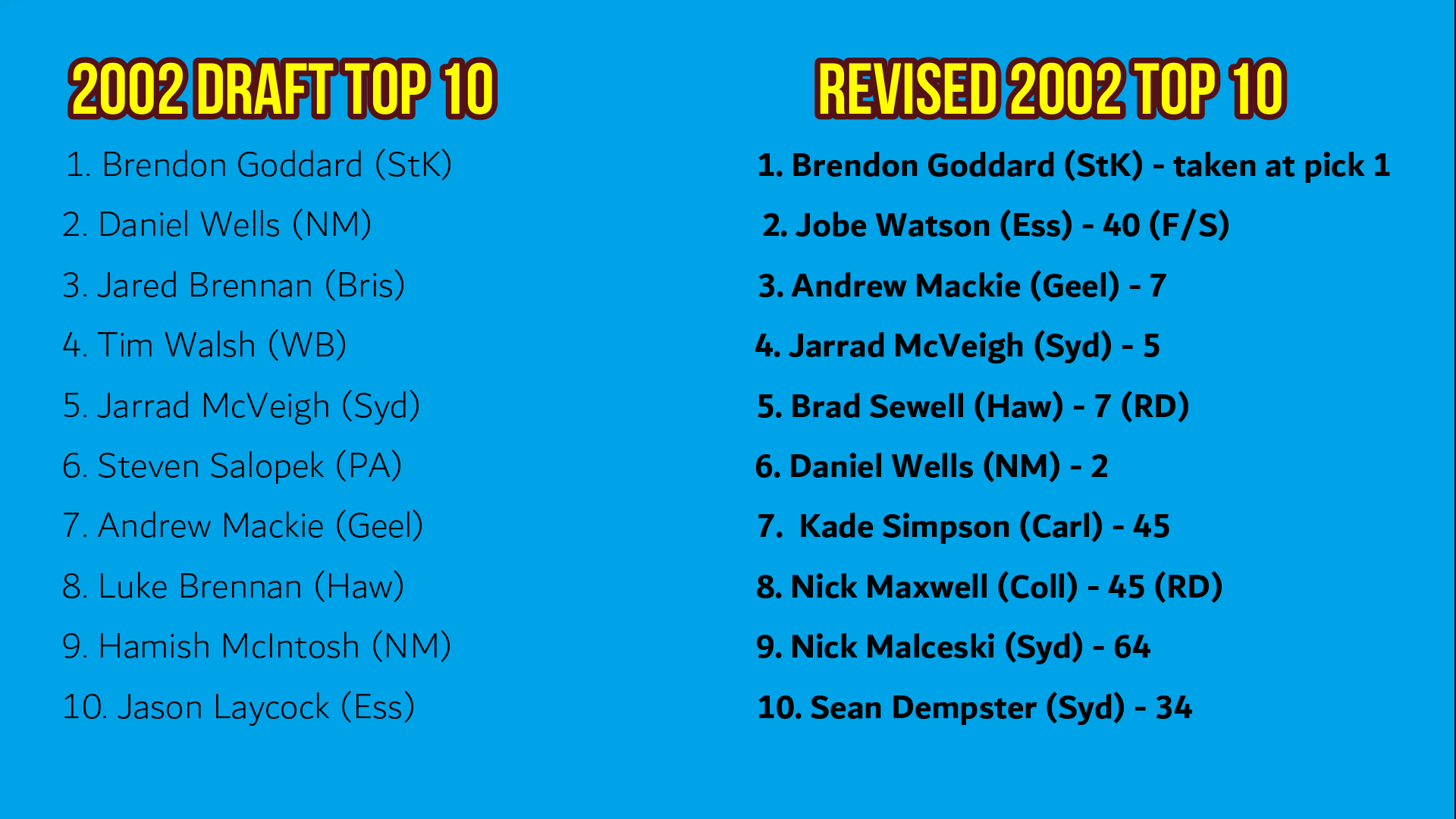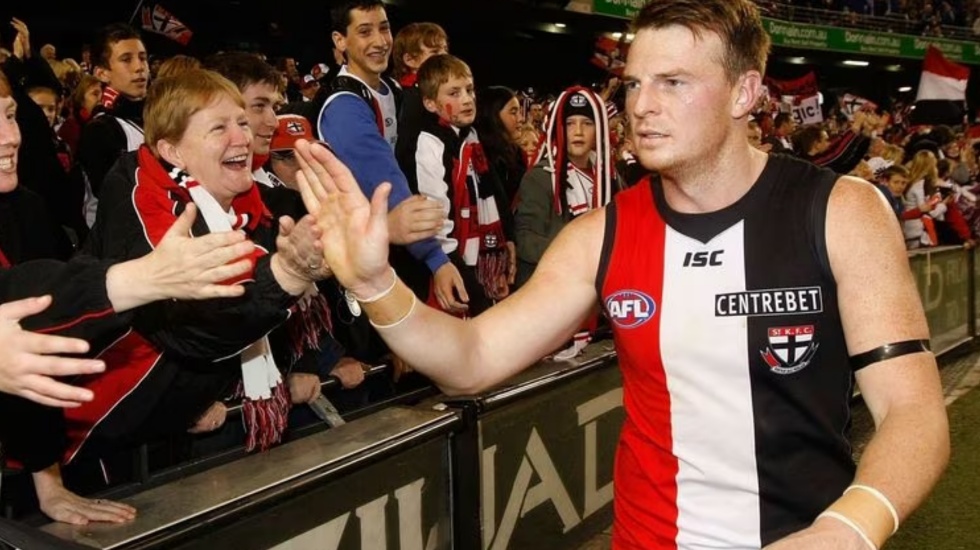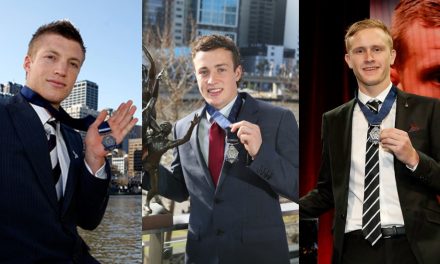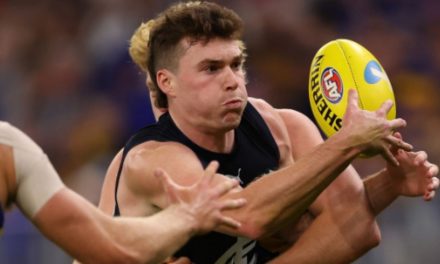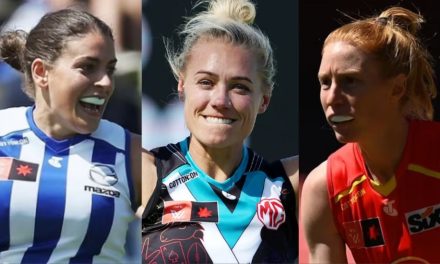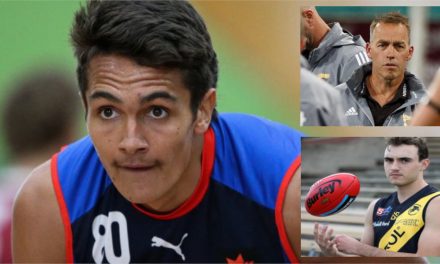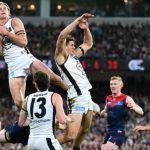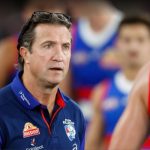Brendon Goddard was a fan favourite during his 10-year stint at the Saints. Photo: AFL MEDIA
It is very rare for the top pick in a national draft to also wind up being the best player of his class.
But at the turn of the century, St Kilda managed to pull off the feat twice in three years.
Not long after selecting Nick Riewoldt at No.1 in the 2000 draft, the Saints snared Brendon Goddard with the first pick in 2002.
And just like Riewoldt was able to do in the 2000 Footyology Redraft, Goddard has also retained his spot atop the heap in the 2002 edition.
The 2002 draft was supposed to be the start of Carlton’s rebirth, but after being found guilty of serious salary cap breaches, that year’s wooden spooners were stripped of the first two picks, which meant Goddard and Daniel Wells made their way to the Saints and Kangaroos respectively instead of Princes Park.
Goddard was a sensational player who was mainly used as a defender, but could easily have an impact in the midfield and was also capable of drifting forward, kicking 160 goals from his 334 games, including a bag of five and two hauls of four.
A key member of the Saints’ last great era, playing in five preliminary finals and three grand finals (including the 2010 replay) in the space of seven seasons, Goddard took one of the great grand final marks in the drawn match against Collingwood.
Had the Saints gone on to win the flag that day, the mark, and subsequent goal, undoubtedly would’ve been remembered as one of the most famous moments in VFL/AFL history, let alone the success-starved Saints’ history.
But unfortunately for Goddard and St Kilda, it wasn’t to be.
Goddard was supremely gifted and a stabilising force out on the park for whichever team he played in.
The durable and dependable utility played the final six years of his career at Essendon, and didn’t miss a step there either, maintaining his high level of consistency until he retired after 16 seasons, two All-Australians and a best-and-fairest.
His Essendon teammate Jobe Watson comes in at No.2 after originally making his way to the Bombers with pick 40 as a father-son selection.
The progeny of the legendary triple premiership superstar Tim Watson, to say expectations on Jobe were high would’ve been an understatement.
PLEASE HELP US CONTINUE TO THRIVE BY BECOMING AN OFFICIAL FOOTYOLOGY PATRON. JUST CLICK THIS LINK.
Watson took a while to find his feet in the AFL, so much so that former coach Kevin Sheedy later admitted he would have traded the son of a gun in 2007 had he remained in the job.
But Sheedy’s 27-year reign at Essendon came to an end that same year, allowing Watson a stay of execution, and he made the most of his reprieve by becoming one of the best players in the competition.
His foot skills underwent a dramatic transformation and he went to the next level in 2009, winning his first of three best-and-fairests, and was duly named club captain the following the year.
Watson proceeded to claim a pair of All-Australian jumpers, and was even named the AFLPA’s best captain in season 2012. That same year he was awarded the Brownlow Medal.
But in later years, as a result of his involvement in the club’s disastrous drug scandal, he was stripped of the award. Hawthorn’s Sam Mitchell and Richmond’s Trent Cotchin were retrospectively named joint winners of the 2012 Brownlow as they finished equal second that year.
In a career spanning 220 games, Watson averaged 25 disposals (11 contested) and five clearances, while also kicking a total of 113 goals.
Completing the top three is triple premiership Geelong defender Andrew Mackie who enjoys a slight upgrade from seven.
Mackie was a mainstay of the Cats’ famed backline during their golden run between 2007 and 2011, and earned himself an All-Australian jumper in 2013.
He joined forces with the likes of Matthew Scarlett, Corey Enright, Harry Taylor, Darren Milburn, Tom Harley and Tom Lonergan to form some of the most formidable defensive units of the modern era.
The Glenelg product was ever-reliable and ended up playing 280 games across 15 seasons, 10 of which saw him play a minimum of 21 matches.
Rounding out the top five are Sydney 325-gamer Jarrad McVeigh, who jumps to four from five, and dual Hawthorn premiership star Brad Sewell who was originally selected with pick seven in the rookie draft, which equates to a promotion of 97 spots.
Wells comes in at No.6, Carlton stalwart Kade Simpson zooms up to seven from 45 and Collingwood premiership captain Nick Maxwell gets promoted 132 spots from the 45th pick in the rookie draft all the way up to No.8.
McVeigh’s premiership teammate Nick Malceski climbs up to nine from 64, while another flag-winning Swan in Sean Dempster completes the revised top 10 after originally being taken at 34.
*Redrafts only consider the first time a player was drafted.
